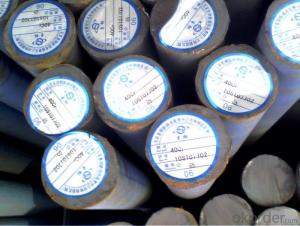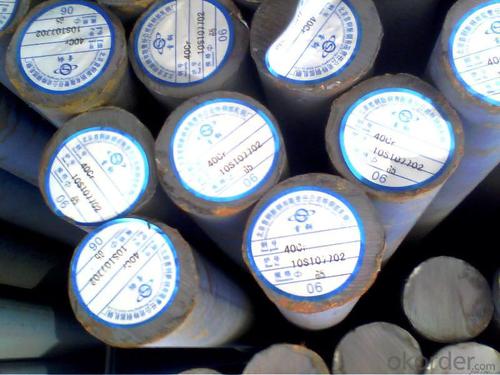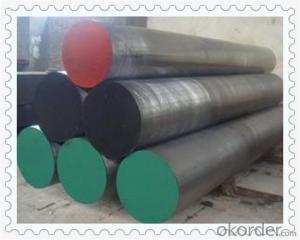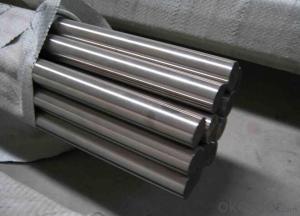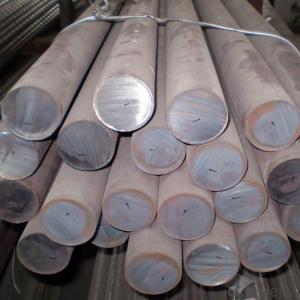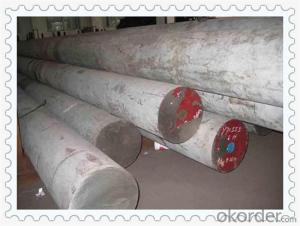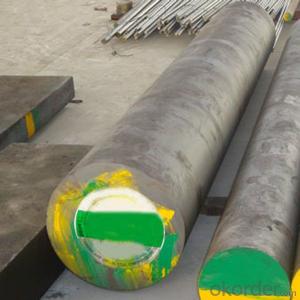20MnCr5 42CrMo4 4340 Alloy Steel Round Bar
- Loading Port:
- China main port
- Payment Terms:
- TT OR LC
- Min Order Qty:
- 30 m.t.
- Supply Capability:
- 10000 m.t./month
OKorder Service Pledge
OKorder Financial Service
You Might Also Like
Specification
20MnCr5 42CrMo4 4340 Alloy Steel Round Bar
Product Information:
1.Grade: 20MnCr5 42CrMo4 4340
2.Dia:12-300mm
3.Length:3-12m
4.Hot rolled
5.MOQ: 30mt per size
Product Overviews:
| Product Name | Typical Grades | Diameter(mm) | Standard adopted |
| Carbon Steel | 20 (1020/S20C/C22) | Ø16-Ø300 | GB/SAE/JIS/DIN |
| 40 (1040/S40C/C40) | |||
| 45 (1045/S45C/C45) | |||
| Bearing Steel | GCr9 (51100/SUJ1) | Ø12-Ø250 | |
| GCr15 (52100/SUJ2/100Gr6) | |||
| GCr9SiMn (A485-Gr.1/SUJ3) | |||
| Cr-Mo Steel | 20Cr (5120/SCr420H/20Cr4) | Ø12-Ø250 | |
| 40Cr (5140/SCr440/41Cr4) | |||
| 42CrMo(4140/SCM440/42CrMo4) | |||
| Gear Steel | 20CrNiMo | Ø16-Ø600 | |
| 20CrMn(5115/SMnC420/20MnCr5) | |||
| 20CrNiMo(8620/SNCM220/20CrMiMo2) |
Product Show:

Our Advantages:
· Industry experience over 20 years.
· Shipment of goods -More than 70 countries worldwide.
· The most convenient transport and prompt delivery.
· Competitive price with best service.
· High technical production line with top quality products.
· High reputation based on best quality products.
With our experienced, enthusiastic and dynamic staffs, we assure to bring you the products with best quality, reasonable prices and good after-sales services under the motto: Friends First, Business After.
Communication, Experience, Expertise and Best efforts are our Promises to you.
- Q: How is high-temperature alloy steel used in the production of heat exchangers?
- High-temperature alloy steel is commonly used in the production of heat exchangers due to its exceptional corrosion resistance, high strength, and ability to withstand extreme temperatures. It helps in maximizing the efficiency of heat transfer by maintaining structural integrity and preventing any degradation caused by the harsh operating conditions.
- Q: What are the properties of structural steel?
- Structural steel possesses various properties that make it ideal for construction purposes. It has high strength-to-weight ratio, meaning it can support heavy loads while being relatively lightweight. Steel is also ductile, allowing it to be easily shaped and formed into various structural elements. Additionally, it exhibits excellent durability and resistance to corrosion, making it suitable for long-lasting structures. Moreover, structural steel is fire-resistant, providing enhanced safety in case of a fire. Overall, these properties make structural steel a highly versatile and reliable material in the construction industry.
- Q: What are the different methods of surface carburizing for special steel?
- Some of the different methods of surface carburizing for special steel include pack carburizing, gas carburizing, liquid carburizing, and plasma carburizing.
- Q: What are the common grades of special steel?
- The common grades of special steel vary depending on the specific application and desired properties. Some of the commonly used grades include: 1. Stainless steel: This is a corrosion-resistant steel alloy that contains a minimum of 10.5% chromium. Grades such as 304, 316, and 410 are commonly used in various industries due to their excellent corrosion resistance, high strength, and good formability. 2. Tool steel: These grades are specifically designed for toolmaking and are known for their high hardness, wear resistance, and toughness. Common tool steel grades include D2, A2, O1, and S7, each having specific properties suitable for different applications. 3. High-speed steel (HSS): HSS is a type of tool steel that can retain its hardness and cutting ability even at high temperatures. It is commonly used in cutting tools such as drills, end mills, and taps. M2, M35, and M42 are some of the common grades of HSS. 4. Alloy steel: As the name suggests, alloy steel is made by adding different alloying elements to enhance specific properties. Grades such as 4140, 4340, and 8620 are commonly used due to their high strength, toughness, and wear resistance. They find applications in industries like automotive, aerospace, and machinery. 5. Spring steel: Spring steel is known for its ability to return to its original shape after being bent or twisted. Grades like 1095 and 5160 are commonly used in the manufacturing of springs, suspension components, and hand tools. These are just a few examples of the common grades of special steel. There are numerous other grades available, each with unique properties and applications. It is important to select the appropriate grade based on the specific requirements of the intended use.
- Q: What are the different types of precipitation-hardening steel?
- There are several types of precipitation-hardening steel, including 17-4 PH, 15-5 PH, 13-8 PH, and 17-7 PH. These steels are known for their high strength and toughness, and they achieve their hardness through a process called precipitation hardening, which involves heat treatment and aging. Each type of precipitation-hardening steel has its own unique composition and characteristics, making them suitable for various applications in industries such as aerospace, automotive, and medical.
- Q: Can special steel be used in power generation applications?
- Indeed, power generation applications can certainly benefit from the utilization of special steel. When we mention special steel, we are referring to a diverse range of steel types that have been specifically engineered to possess superior attributes like high strength, durability, heat resistance, corrosion resistance, and wear resistance. These exceptional properties make special steel an ideal choice for power generation applications where the materials must endure elevated temperatures, pressures, and mechanical strains. Within the realm of power generation, various components and equipment can make use of special steel. Examples include turbine blades, boiler tubes, heat exchangers, steam pipes, and high-pressure valves. To illustrate, thermal power plants, which rely on fossil fuels for electricity generation, often employ special steel in boiler tubes and heat exchangers to withstand the demanding conditions of steam generation, characterized by high temperatures and pressures. Moreover, in the context of nuclear power plants, special steel finds application in critical components such as reactor vessels, steam generators, and fuel cladding. This is due to its exceptional strength, resistance to radiation damage, and resistance to corrosion. Furthermore, the use of special steel extends to renewable energy power generation applications. For instance, in wind turbines, special steel is employed in the construction of turbine towers, rotor blades, and gearboxes. Its purpose is to withstand the challenges of high wind speeds, vibrations, and fatigue. In summary, special steel occupies a vital role in power generation applications, thanks to its extraordinary properties. By ensuring the reliability, efficiency, and longevity of the equipment and components employed in diverse power generation systems, special steel contributes significantly to the field.
- Q: Can special steel be used in the production of fasteners?
- Yes, special steel can be used in the production of fasteners. Special steel, such as alloy steel or stainless steel, offers enhanced strength, corrosion resistance, and durability, making it suitable for various fastening applications. Its unique properties ensure reliable and long-lasting connections in industries like automotive, construction, and aerospace.
- Q: What are the properties of heat-resistant steel?
- Heat-resistant steel has several important properties. First, it has a high melting point, allowing it to withstand extremely high temperatures without melting or losing its structural integrity. Additionally, it exhibits excellent strength and toughness, ensuring that it can withstand mechanical stresses even at elevated temperatures. Heat-resistant steel also possesses good oxidation resistance, preventing it from reacting with oxygen and forming destructive oxides when exposed to high temperatures. Furthermore, it has low thermal expansion, which means it maintains its shape and dimensions even under extreme thermal conditions. Overall, these properties make heat-resistant steel highly suitable for applications involving high temperatures, such as in furnaces, boilers, and aerospace components.
- Q: Can special steel be used in the aerospace parts manufacturing industry?
- Yes, special steel can be used in the aerospace parts manufacturing industry. Special steel alloys, such as stainless steel and titanium alloys, possess properties like high strength, corrosion resistance, and heat resistance, making them suitable for use in critical aerospace components like engine parts, landing gears, and structural elements. Their ability to withstand extreme conditions, along with their lightweight nature, makes special steel a preferred choice in the aerospace industry to ensure safety, durability, and optimum performance of aircraft.
- Q: What are the requirements for special steel used in wind turbines?
- The requirements for special steel used in wind turbines are crucial for ensuring the reliability, efficiency, and durability of these large-scale renewable energy systems. Here are some of the key requirements: 1. Strength and Durability: Special steel for wind turbines must possess high strength and durability to withstand the harsh operating conditions, including strong winds, vibrations, and extreme temperature variations. It should have a high fatigue resistance to endure cyclic loading over the turbine's operational life, which can be up to 20-25 years. 2. Corrosion Resistance: Wind turbines are often installed in coastal or offshore environments, where they are exposed to corrosive saltwater and salt-laden air. Therefore, the special steel used in wind turbines must have excellent corrosion resistance to prevent degradation and ensure long-term performance. 3. Weldability: The steel used in wind turbines should be suitable for welding processes to facilitate the fabrication and assembly of the turbine components. Good weldability allows for efficient construction and maintenance, reducing downtime and associated costs. 4. Low Temperature Toughness: Wind turbines are often located in regions with low temperatures, such as arctic or mountainous areas. Special steel used in these turbines should possess good low-temperature toughness, ensuring its mechanical properties remain intact even in cold climates. 5. Magnetic Properties: Wind turbines employ various electrical components, such as generators and transformers, where electromagnetic fields are present. Special steel used in these components should have specific magnetic properties to minimize energy losses and maximize the efficiency of the electrical system. 6. Cost-effectiveness: While meeting all the above requirements, the special steel used in wind turbines should also be cost-effective. It should offer a good balance between performance and cost to ensure the economic viability of wind energy projects. Meeting these requirements is essential to ensure the long-term operation and sustainability of wind turbines, enabling them to generate clean and renewable energy efficiently.
Send your message to us
20MnCr5 42CrMo4 4340 Alloy Steel Round Bar
- Loading Port:
- China main port
- Payment Terms:
- TT OR LC
- Min Order Qty:
- 30 m.t.
- Supply Capability:
- 10000 m.t./month
OKorder Service Pledge
OKorder Financial Service
Similar products
Hot products
Hot Searches
Related keywords
